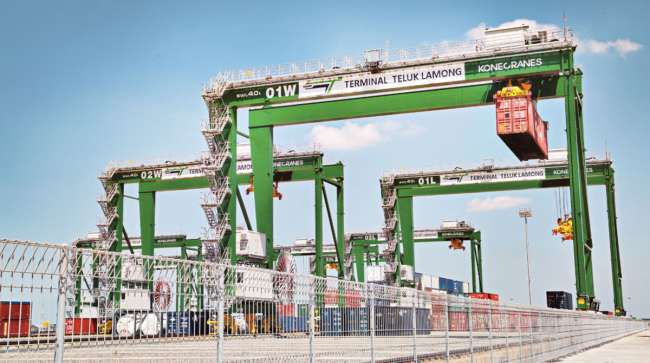Smart Ports: When AI Takes Over Shipping

An autonomous truck is expected to arrive at the Port of Long Beach, Calif., seven minutes late after being rerouted to avoid a heavy-traffic zone. Fully automated cranes unloading containers from a self-piloting ship have been monitoring the truck’s route in real time and already have adjusted their loading schedule to account for the truck’s delay.
The above scenario is not merely the stuff of science fiction. Artificial intelligence and machine learning for both automated container port management and trucks and ships is already in use or under development in a few key ways.
“The application of artificial intelligence is one of the things we are looking to develop as part of a five-year plan we are already putting into place,” said Bethann Rooney, assistant director for strategy and innovation at the Port Authority of New York and New Jersey.
RELATED: Automated Ports Help Carriers Get in and Out of Facilities Faster
AI forms the basis of a system that gathers data, often from several sources, and processes that data in ways that mirror the workings of a human brain. For example, AI is the main technology behind working truck prototypes that can drive themselves over designated routes without driver input or monitoring (known as Level 4 autonomous driving).
AI already is in use in automated loading cranes at ports in southern California, New Jersey and Virginia in the United States; Shanghai in China and Rotterdam in the Netherlands. The AI makes decisions about which containers to stack or unload first based on a database and other analyses.
Currently, AI is used for predictive maintenance of port equipment or for optimization of automated cranes, said Timo Alho, vice president for terminal development at Kalmar. In this way, cranes are able to load and stack loads more efficiently in ways that improve container availability for trucks on an as-needed basis.
“Automated equipment provides huge amounts of data that has never been available from terminal operations before,” Alho said. “And it can be seen that in the future, AI and machine learning will be able to make use of this data and create value by optimizing terminal operations beyond current expectations.”
Data relating to container port deliveries and shipments is continually stored and analyzed as the basis for future AI and machine-learning assisted tools that are expected to one day manage entire delivery cycles.
AI also will help motor carriers gather and apply data for container deliveries more efficiently, said Robert Loya, director of operations at CMI Transportation. The use of AI in a centralized portal of information “is one way we plan to avoid spending more man hours to do redundant, labor-intensive work and replace that with something much more efficient and reliable.”

